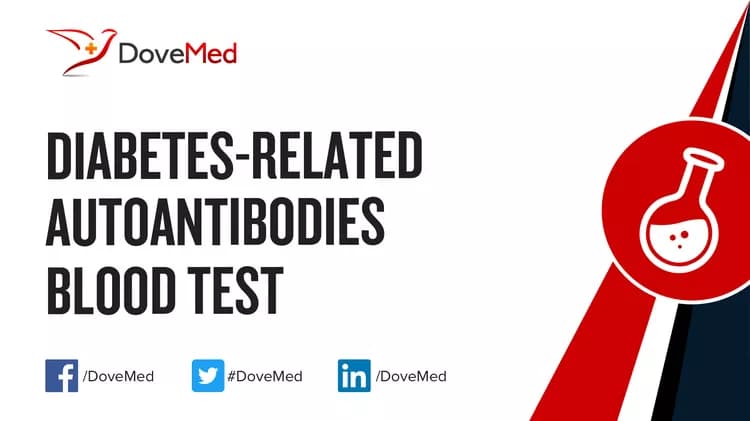What are the other Names for this Test? (Equivalent Terms)
- Glutamic Acid Decarboxylase Autoantibodies Blood Test
- IA-2A Blood Test
- Insulin Autoantibodies Blood Test
What is Diabetes-Related Autoantibodies Blood Test? (Background Information)
- Diabetes-related autoantibodies are abnormal bodily defense proteins associated with type 1 or insulin-independent, diabetes mellitus
- Diabetes mellitus is a metabolic disorder in which blood sugar levels remain significantly elevated for extended periods of time. It results from an inability to produce or respond to insulin
- Insulin is the major blood sugar regulatory hormone. It is produced by the beta cells of the pancreas and affects nearly every cell in the body, helping the cells to absorb glucose from the blood stream. Beta cells are a type of specialized hormone-secreting pancreas cells, called islet cells. Other islet cells include alpha cells, which secrete glucagon, and delta cells
- Diabetes can be characterized as one of two types depending on its cause:
- Type 1 or insulin-dependent, diabetes, results from an inability to produce enough insulin. It is often due to autoimmune destruction of the beta cells of the pancreas. The condition is referred to as juvenile diabetes, because it often develops in childhood
- Type 2 or insulin-independent, diabetes, results from an inability of the body cells to respond to insulin as a result of desensitization over time. This is called insulin resistance
- Type 1 diabetes is associated with the production of diabetes-related autoantibodies. However, these are not thought to be the antibodies responsible for beta cell destruction
- The Diabetes-Related Autoantibodies Blood Test is a group of blood tests to assess the levels of various autoantibodies, known to be associated with type 1 diabetes. They are used to differentiate between type 1 diabetes and type 2 diabetes
- The Diabetes-Related Autoantibodies Blood Test comprises the following individual tests:
- Islet Cell Cytoplasmic Autoantibodies (ICA) Blood Test: To detect autoantibodies that target various islet cell proteins
- Glutamic Acid Decarboxylase Autoantibodies (GADA) Blood Test: To detect autoantibodies that target beta cells
- Insulinoma-Associated-2-Autoantibodies (IA-2A) Blood Test: To detect autoantibodies that target beta cells
- Insulin Autoantibodies (IAA) Blood Test: To detect autoantibodies that target insulin. IAA is more specific to beta cells than the other 3 tests (above)
What are the Clinical Indications for performing the Diabetes-Related Autoantibodies Blood Test?
The clinical indications for performing a Diabetes-Related Autoantibodies Blood Test include differentiating between Type 1 Diabetes and Type 2 Diabetes in an individual with known diabetes.
How is the Specimen Collected for Diabetes-Related Autoantibodies Blood Test?
Following is the specimen collection process for Diabetes-Related Autoantibodies Blood Test:
Sample required: Blood
Process: Insertion of a needle into an arm vein.
Preparation required: No special preparation is needed prior to the test.
What is the Significance of the Diabetes-Related Autoantibodies Blood Test Result?
The presence of Islet Cell Cytoplasmic Autoantibodies (ICA), Glutamic Acid Decarboxylase Autoantibodies (GADA), and/or Insulinoma-Associated-2-Autoantibodies (IA-2A), in an individual with suspected diabetes, may indicate Type 1 Diabetes.
The laboratory test results are NOT to be interpreted as results of a "stand-alone" test. The test results have to be interpreted after correlating with suitable clinical findings and additional supplemental tests/information. Your healthcare providers will explain the meaning of your tests results, based on the overall clinical scenario.
Additional and Relevant Useful Information:
- Certain factors may interfere with the results of the Diabetes-Related Autoantibodies Blood Test. These include Hashimoto thyroiditis and autoimmune Addison’s disease
Certain medications that you may be currently taking may influence the outcome of the test. Hence, it is important to inform your healthcare provider, the complete list of medications (including any herbal supplements) you are currently taking. This will help the healthcare provider interpret your test results more accurately and avoid unnecessary chances of a misdiagnosis.
Related Articles
Test Your Knowledge
Asked by users
Related Centers
Related Specialties
Related Physicians
Related Procedures
Related Resources
Join DoveHubs
and connect with fellow professionals


0 Comments
Please log in to post a comment.